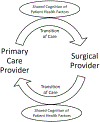Discordance in Information Exchange Between Providers During Care Transitions for Surgical Patients
- PMID: 31299433
- PMCID: PMC6815695
- DOI: 10.1016/j.jss.2019.06.049
Discordance in Information Exchange Between Providers During Care Transitions for Surgical Patients
Abstract
Background: The exchange of health information between primary care providers (PCPs) and surgeons is critical during transitions of care for older patients with multiple comorbidities; however, it is unknown to what extent this process occurs. This study was designed to characterize the extent to which factors associated with older patient's recovery, such as functional status, cognitive status, social status, and emotional factors, are shared among PCPs and surgical providers during care transitions.
Materials and methods: We prospectively identified 15 patients aged over 60 y with ≥3 comorbidities referred for general and vascular surgery procedures at a Veterans Administrative and academic medical center. Semistructured Critical Decision Method interviews were conducted with patients along with their surgical providers and referring PCPs. Thematic content analysis was performed independently by five reviewers on the cognitive processes associated with functional status, cognitive status, social status, and emotional factors. Interrater reliability between providers and patients was assessed using Cohen's kappa.
Results: Forty-seven Critical Decision Method interviews were conducted, which included 20 paired interviews between a PCP and a surgeon and 16 paired interviews that involved a patient and a provider. The majority of patients reported experiencing poor information exchange between their PCP and surgeon (58%) and feeling they were primarily responsible for communicating their own health information during care transitions (67%). In paired interviews between PCPs and surgeons, there was nearly perfect agreement for the shared knowledge of cognitive (kappa: 0.83) and emotional (kappa 1) factors. In contrast, there was only minimal agreement for shared knowledge of functional status (kappa 0.38) and social status (kappa: 0.34).
Conclusions: Information exchange between PCPs and surgical providers is often discordant during transitions of surgical care for medically complex older patients, particularly when it pertains to communicating their functional or social status.
Keywords: Care transitions; Cognitive status; Communication; Functional status; Primary care; Social status; Surgery.
Published by Elsevier Inc.
Figures
Similar articles
-
Task Delegation and Burnout Trade-offs Among Primary Care Providers and Nurses in Veterans Affairs Patient Aligned Care Teams (VA PACTs).J Am Board Fam Med. 2018 Jan-Feb;31(1):83-93. doi: 10.3122/jabfm.2018.01.170083. J Am Board Fam Med. 2018. PMID: 29330243
-
Veterans Affairs Primary Care Provider Perceptions of Insomnia Treatment.J Clin Sleep Med. 2017 Aug 15;13(8):991-999. doi: 10.5664/jcsm.6702. J Clin Sleep Med. 2017. PMID: 28728623 Free PMC article.
-
Physician Specialties Involved in Thyroid Cancer Diagnosis and Treatment: Implications for Improving Health Care Disparities.J Clin Endocrinol Metab. 2022 Feb 17;107(3):e1096-e1105. doi: 10.1210/clinem/dgab781. J Clin Endocrinol Metab. 2022. PMID: 34718629 Free PMC article.
-
Primary care access and emergency room use among older veterans.J Gen Intern Med. 2014 Jul;29 Suppl 2(Suppl 2):S689-94. doi: 10.1007/s11606-013-2678-8. J Gen Intern Med. 2014. PMID: 24715391 Free PMC article.
-
A Mixed-Methods Study of Veterans Affairs Providers' Experiences Communicating With Patients About the Affordable Care Act.Mil Med. 2017 May;182(5):e1715-e1723. doi: 10.7205/MILMED-D-16-00354. Mil Med. 2017. PMID: 29087916
Cited by
-
Evaluation of a Health Information Exchange System for Geriatric Health Care in Rural Areas: Development and Technical Acceptance Study.JMIR Hum Factors. 2022 Sep 15;9(3):e34568. doi: 10.2196/34568. JMIR Hum Factors. 2022. PMID: 36107474 Free PMC article.
-
Evaluations of postoperative transitions in care for older adults: a scoping review.BMC Geriatr. 2022 Apr 15;22(1):329. doi: 10.1186/s12877-022-02989-6. BMC Geriatr. 2022. PMID: 35428193 Free PMC article.
-
A Framework to Optimize Primary Care of Older Surgical Patients: A Qualitative Study of Geriatricians.JAMA Netw Open. 2025 Jan 2;8(1):e2456787. doi: 10.1001/jamanetworkopen.2024.56787. JAMA Netw Open. 2025. PMID: 39869335 Free PMC article.
-
Cross-Sectional Analysis of Patients Referred to a Tertiary Lymphatic Surgery Center.Ann Surg Oncol. 2025 Jan;32(1):542-550. doi: 10.1245/s10434-024-16304-7. Epub 2024 Oct 9. Ann Surg Oncol. 2025. PMID: 39382745
-
Preferred Functions of Personal Health Records in Rural Primary Health Clinics in Canada: Health Care Team Perspectives.Appl Clin Inform. 2021 Jan;12(1):41-48. doi: 10.1055/s-0040-1721397. Epub 2021 Jan 20. Appl Clin Inform. 2021. PMID: 33472257 Free PMC article.
References
-
- Press MJ, Instant replay--a quarterback’s view of care coordination. N Engl J Med, 2014. 371(6): p. 489–91. - PubMed
-
- Lippa KD, et al., Navigating the Decision Space: Shared Medical Decision Making as Distributed Cognition. Qual Health Res, 2017. 27(7): p. 1035–1048. - PubMed
-
- Kripalani S, et al., Deficits in communication and information transfer between hospital-based and primary care physicians: implications for patient safety and continuity of care. JAMA, 2007. 297(8): p. 831–41. - PubMed
Publication types
MeSH terms
Grants and funding
LinkOut - more resources
Full Text Sources


